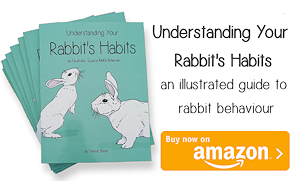Homemade Indoor Rabbit Hutch
There is no reason why rabbit housing can't be good looking as well as functional, as demonstrated by this great cupboard conversion by Netherland's interior designer Evelien Lulofs for her rabbits Amigo and Tinq.

Step 1 Find a Cupboard to Convert
Evelien's conversion is based on an Ikea Besta Cupboard, but you could use the same technique on any suitable sized cupboard or sideboard that matches your home's decor. If you are working with a tight budget look for second furniture.
Step 2 Link the cupboard sections
If your cupboard is divided into compartments, you'll need to cut a doorway between them. Any rough edges can be covered with wooden trim (painted or stained to match your cupboard it will blend in).


You could use the same technique to link two smaller cupboards together.
Step 3 Line the Floor
The floor of your cupboard will need lining to protect it from accidents or water spills. These mini mosaic tiles create a beautiful and hardwearing surface.

If you're not sure about your tiling skills you could use lino instead. Cut it to size, glue or use double sided tape to hold it in place and then use beading/trim around the edge to create a neat seal and protect the edges from chewing/digging.
Step 4 Shelf
This cupboard already had a shelf, but if yours doesn't it's a great way to add extra floor space. Cut a piece of board to fit and use brackets or shelf support blocks to support it. Most rabbits can easily jump on to a low shelf without a ramp.

Step 5 Doors
These doors are made with a grooved frame. The wire is slotted in and then the frame fixed together to hold it in position. You maybe able to buy wood with a grooves already or ask your local timber supply store to make them for you if you don't have the tools yourself.


Alternatively you could attach the mesh with cable clips. If you use that method, fix the mesh on the inside of the doors so the attachments aren't visible when closed.
Plastic coated mesh provides the nicest finish. If you can't find the size or colour you want then buy plain stainless steel weld mesh and finish it with Plastikote Fast Dry Enamel spray paint. This available in a wide array of colours and is completely non toxic once dry. Apply the paint to the mesh before attaching it to the frame.
Note how, with the doors closed, the solid part of the right door creates a fully enclosed space for the rabbits to hide/retreat to. This is an important feature and it's a good idea to have a solid section for this purpose.

Don't forget you'll need hinges and something to keep the doors closed e.g. a magnetic door catch or small bolt.
The finished hutch kitted out with litter tray, bowls, bed and toys:
















